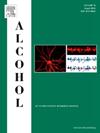创伤对酒精自我管理影响的性别差异
IF 2.9
4区 医学
Q3 PHARMACOLOGY & PHARMACY
引用次数: 0
摘要
具有挑战性的遭遇会导致酒精消费量增加,这一点从与创伤后应激障碍(PTSD)作斗争的个人身上就可以看出。然而,与急性压力源相反,先前的压力经历对酒精摄入量的确切影响仍不完全清楚。本研究试图通过在充满气味的环境中进行足部冲击的应激模式来模拟创伤的持久影响。在情境恐惧条件反射中,气味的存在更有可能导致压力效应在各种环境中普遍存在,而这种模式先前会降低工作记忆的表现,这是创伤后应激障碍的一个标志。将雄性和雌性Wistar大鼠暴露在应激或控制条件下(无足部电击),然后训练它们执行杠杆按压以获得酒精强化。研究结果揭示了在过去的压力对获得酒精自我管理的影响方面,两性之间存在有趣的差异。具体来说,雌性大鼠在几天内表现出不同的酒精获取模式,与之前有压力的对照组相比,对照组的获得速度更快。在男性中没有观察到这种模式,在5周的戒断期后,两种性别在复发性自我给药方面也没有表现出差异。出乎意料的是,压力会话气味提示并没有改变酒精自我管理行为。总之,这些数据支持了雌性对创伤性压力源的高度敏感性,尽管与人类的数据相反,在大鼠中这种自我管理减少了。本文章由计算机程序翻译,如有差异,请以英文原文为准。
Sex differences in the impact of trauma on alcohol self-administration
Challenging encounters can lead to escalated alcohol consumption, as evidenced by individuals grappling with posttraumatic stress disorder (PTSD). However, the precise influence of prior stress experiences, as opposed to acute stressors, on alcohol intake remains incompletely understood. This study sought to simulate the enduring repercussions of trauma using a stress paradigm involving foot shocks presented in an odor-enriched environment. The presence of a scent throughout contextual fear conditioning is more likely to cause stress effects to generalize across various environments, and this paradigm previously reduced working memory performance, one hallmark of PTSD. Male and female Wistar rats were exposed to the stress or control condition (no foot shock), then trained to perform lever presses to obtain alcohol reinforcement. The findings revealed intriguing disparities between the sexes in past stress effects on the acquisition of alcohol self-administration. Specifically, female rats exhibited divergent patterns of alcohol acquisition across days, with the control group showing a swifter acquisition compared to their previously stressed counterparts. This pattern was not observed in males, nor did either sex show differences in relapse-like self-administration after a 5-week abstinence period. Unexpectedly, presentation of the stress session odor cue did not alter alcohol self-administration behavior. Together, these data support heightened sensitivity of females to a trauma-like stressor, although in rats this decreased self-administration, contrary to human data.
求助全文
通过发布文献求助,成功后即可免费获取论文全文。
去求助
来源期刊

Alcohol
医学-毒理学
CiteScore
4.60
自引率
4.30%
发文量
74
审稿时长
15.6 weeks
期刊介绍:
Alcohol is an international, peer-reviewed journal that is devoted to publishing multi-disciplinary biomedical research on all aspects of the actions or effects of alcohol on the nervous system or on other organ systems. Emphasis is given to studies into the causes and consequences of alcohol abuse and alcoholism, and biomedical aspects of diagnosis, etiology, treatment or prevention of alcohol-related health effects.
Intended for both research scientists and practicing clinicians, the journal publishes original research on the neurobiological, neurobehavioral, and pathophysiological processes associated with alcohol drinking, alcohol abuse, alcohol-seeking behavior, tolerance, dependence, withdrawal, protracted abstinence, and relapse. In addition, the journal reports studies on the effects alcohol on brain mechanisms of neuroplasticity over the life span, biological factors associated with adolescent alcohol abuse, pharmacotherapeutic strategies in the treatment of alcoholism, biological and biochemical markers of alcohol abuse and alcoholism, pathological effects of uncontrolled drinking, biomedical and molecular factors in the effects on liver, immune system, and other organ systems, and biomedical aspects of fetal alcohol spectrum disorder including mechanisms of damage, diagnosis and early detection, treatment, and prevention. Articles are published from all levels of biomedical inquiry, including the following: molecular and cellular studies of alcohol''s actions in vitro and in vivo; animal model studies of genetic, pharmacological, behavioral, developmental or pathophysiological aspects of alcohol; human studies of genetic, behavioral, cognitive, neuroimaging, or pathological aspects of alcohol drinking; clinical studies of diagnosis (including dual diagnosis), treatment, prevention, and epidemiology. The journal will publish 9 issues per year; the accepted abbreviation for Alcohol for bibliographic citation is Alcohol.
 求助内容:
求助内容: 应助结果提醒方式:
应助结果提醒方式:


